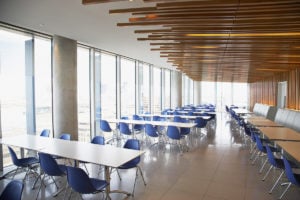By Nelson Cary and Thomas Loeb
In a win for employers’ private property rights, the NLRB last month gave employers greater rights to control how their property is used, including what occurs on publicly accessible spaces within that property, like a cafeteria. In UPMC Presbyterian Hospital, 368 N.L.R.B. No. 2 (2019), the NLRB held that “an employer may prohibit nonemployee union representatives from engaging in promotional activity, including solicitation or distribution in its public cafeteria so long as it applies the practice in a nondiscriminatory manner by prohibiting other nonemployees from engaging in similar activity.”
In doing so, the NLRB overturned prior decisions the majority described as creating a “public space” exception to a U.S. Supreme Court decision from the mid-1950’s. The NLRB emphasized that the employer’s authority to prohibit such behavior lies in its ability to regulate the conduct that occurs in its public spaces, and not the content of the speech of those who use these spaces.
In UPMC, the hospital had a practice of prohibiting all nonemployees “from engaging in promotional activities, including solicitation and distribution, in its public cafeteria.” To enforce this policy, a security guard had the Pittsburgh police remove two, nonemployee union representatives who were using a cafeteria table to, among other things, eat lunch with employees, discuss union organizing campaign matters, and display (and distribute) union flyers and campaign buttons. One off-duty employee passed out some of the flyers to others in cafeteria.
According to the NLRB, the hospital’s application of its practice to this conduct was appropriate. The hospital was able to demonstrate a number of other occasions on which it removed nonemployees from its cafeteria for engaging in similar, albeit non-union-related, behavior.
In a scathing dissent, Member McFerran (D) sharply disputed the majority’s interpretation of the relevant case law and alleged that the majority “has conjured a factual situation” unsubstantiated by the record to arrive at its conclusion. Ultimately, the dissent claims that the hospital removed the union’s representatives from the premises because they were union representatives.
For labor professionals, the NLRB’s decision has at least three significant implications:
- First, and at a minimum, employers will want to revisit their policies to determine whether revisions are possible or appropriate in light of their industry and employee relations approach. The case arose out of a union’s use of an employer’s public cafeteria, but its reasoning could have broader implications.
- Second, employers will want to assess the means by which access policies are enforced. As the NLRB made abundantly clear, consistency and uniformity in enforcement is key to lawful employer action in this area.
- Third, labor professionals should note how the NLRB phrases its holding. Employers may prohibit “promotional” activities, “including” solicitation and distribution, in a cafeteria. Indeed, the majority indicated in a footnote that its decision did not rest upon a finding that the union’s representatives were involved in solicitation or distribution.

